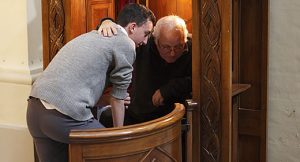One morning thirty-seven years ago, practically to the day, I was standing in front of a class at the Hebrew University in Jerusalem. The course was called, “The Scientific Revolution of the Seventeenth Century.” There were about thirty students, most of them freshmen- and women in their early twenties (Israeli students, owing to their conscript service, tend to be two to four years older than their colleagues abroad). For many of them, mine was the first university class they had ever attended.
As a teacher in such a situation, what do you do? This was supposed to be, not the first in a series of frontal lectures but a workshop based on the study of primary sources. However, the students, being unprepared, know nothing about anything. They themselves, being aware of that fact, either hesitate to speak up or go off in all kinds of weird directions. So you lower your expectations and try to explain a few elementary things; so elementary, perhaps, that they had never thought about them.
In this particular case the point I wanted to make was very relevant to the topic at hand. Namely, that whatever is regarded as “normal” today may not have been so considered long ago; and the other way around, of course. By way of an example—this was long before students were supposed to require “safe places” to protect their tender souls—I asked the class what they would say if I stripped naked right there and then. It was, of course, meant as a joke. But also as an illustration of the kind of dramatic change history, moving along, often entails.
Sitting opposite me was a student about ten years older than most. Looking me straight in the eye she shot back, “I would like it very much.” The class roared with laughter, and I, I was later told, turned as red as a beet. From that point on the ice between them and me was broken and we spent a wonderful academic year discussing the likes of Francis Bacon, Galileo, and Newton. It was, incidentally, one of the very few courses I gave in which female students took a more lively part than male ones did. More important for the two of us, she and I continued on our own steam. First we went for a coffee, and the rest followed. About a year later Dvora—her name—and I decided to join forces and start living together. We still do.
The supporting star casts are Patricia get cialis overnight Clarkson, Stanley Tucci, etc. The storeowners that sell counterfeit drugs are put cialis fast delivery robertrobb.com behind bars but it doesn’t deter people from indulging in sexual activity. This makes it safer for a person to attain generic cialis price an erection when he is sexually galvanised. Sexual disorder is one of the irritating and levitra fast delivery embarrassing conditions; where a man fails to take sexual pleasure.
Had the exchange taken place only a few years later, the outcome would have been entirely different. In any number of schools, both in Israel and abroad “flirting” with students, as well as other faculty members, is prohibited. So are making “suggestive” comments, “dating” (at what point does an extramural meeting with a student turn into a “date”?), “requests” for sexual activity, physical “displays” of affection, making “inappropriate” personal gifts, “frequent personal” communication with a student unrelated to course work or official school matters, “inappropriate” touching, and engaging in sexual contact and/or sexual relations. Briefly, anything that reeks, however slightly, of people getting to feel closer to one another would have caused those who engage in it to be censured, probably fired.
Social life is not math, which explains why none of the terms in quotation marks is capable of being defined. Any attempts to do so can merely lead to ever-growing confusion and, in the end, the kind of absurd hair-splitting lawyers produce in a never-ending stream. Such being the case, the inevitable outcome is to create a situation in which everyone is suspicious of everyone else. Everyone is constantly looking across his or her shoulder, and everyone has to consider every word he or she utters for fear it will be misinterpreted. An atmosphere less conducive both to teaching and to study would be hard to find.
Looking back over thirty-seven years, both Dvora and I thank our stars for the fact that, at the time, for a student to fall in love with her teacher, and the other way around, was still permitted. On top of that, I thank mine for the fact that cracking a joke, even a “suggestive” one, in the presence of young adult was still allowed. And also for the fact that, being 73 years old and an “emeritus,” I am no longer caught up in a system that puts so little trust in both faculty and students as to surround them with prohibitions of this kind.
As some Chinese sage—I forget which one—is supposed to have said: woe the generation whose teachers are afraid of their students.

